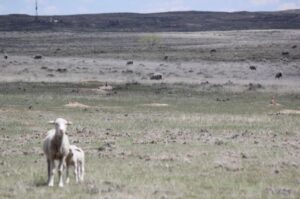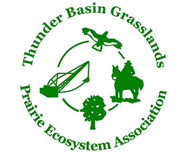
Abstract
The Thunder Basin ecoregion (TBER) of northeastern Wyoming is located in an ecotone, or transition zone, between the Great Plains to the east and the sagebrush steppe to the west, creating a landscape with tremendous biodiversity and complexity. Throughout this dynamic region, TBER supports multiple land uses which occur across a matrix of public and privately-owned land. Ranching is a central component to the culture of TBER, with the five counties in TBER producing disproportionately more livestock from rangeland grazing than other Wyoming counties.
Multiple use management in TBER can support forage production, energy industries, and wildlife conservation, but in recent history has led to conflict between stakeholder groups. Conflict over management decisions has manifested as a result of extreme fluctuations in black-tailed prairie dog populations, which exacerbate differences between ranching and conservation goals.
Land management agencies like the U.S. Forest Service have attempted to respond to conflicting goals through collaborative decision-making processes, but it remains unclear how collaboration between diverse stakeholder groups impacts both agricultural productivity and conservation on public lands. The long-term goal of this project is to assess how management decisions are made in the context of diverse stakeholder perspectives, and examine the socio-ecological impacts of these decisions on grazing intensity over space and time. Lessons from this project will be broadly relevant across the American West, where working landscapes are critical to both biodiversity conservation and agricultural production.
Project Highlights
- Emerged from a community-identified need to address how different groups can more effectively work together
- Identifying the diverse perspectives and knowledge of stakeholders in TBER in order to examine their impact on collaborative management
- Assessing changes in use of federal grazing allotments in relation to changing paradigms in rangeland management
- Integrating scientific findings with artwork to promote a broader, more holistic understanding of TBER and its management
Team
Molly Levy, Boise State University
Vicken Hillis, Boise State University
Dave Pellatz, Thunder Basin Grassland Prairie Ecosystem Association
Lauren Porensky, USDA-ARS
Hailey Wilmer, USDA-ARS
Press
Students win fellowship to promote resilient agricultural communities.
Funding
This project is supported by the predoctoral fellowship program of the U.S. Department of Agricultural, National Institute of Food and Agriculture under award number 2023-67011-40387. This project is also supported by our partnership with the Thunder Basin Grassland Ecosystem Association and the Thunder Basin Research Initiative.


